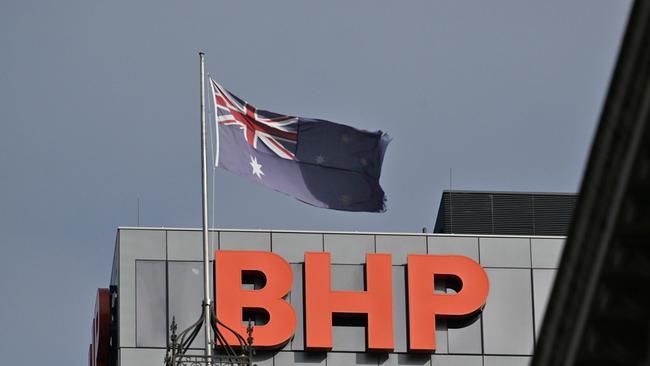
Driving BHP was a calculation that if the world scenario of keeping temperature rises below 1.5 per cent is to be achieved then the copper industry could require around $US250bn ($376bn) in growth capital in the six years to 2030, over and above capital needed to sustain current mines.
Currently, in the vicinity of $US50bn has been committed.
Accordingly, if the world is serious about climate and electrification, then it will need to be serious about copper mine development and the mustering of capital in the most efficient way.
But day to day politics often override lofty long-term ambitions. And so it was that when BHP made unofficial and tentative approaches to Anglo suggesting that the best way to develop its copper potential was in the BHP capital structure, those approaches were quickly leaked into the South African political turmoil. No one knows who actually leaked, but it obviously wasn’t BHP.

The leaker knew the timing was terrible for BHP. South Africa was deeply involved in one of the most tense elections in the post Mandela era, and the deal became a football in the election campaign.
At the weekend, those elections saw the vote of the ANC majority government drop to around 40 per cent, and it must deal with the main opposition party (which was mainly responsible for the fall in the ANC vote) or a party headed by a former hard left president who wants to nationalise vast areas of the country.
With the benefit of hindsight, the BHP thrust should have been made much earlier when there were a set of government precedents to guide the way.
If market forces allow BHP to return to the fray after six months, the state of the South African government and its policies might be very different.
BHP clearly believes that Anglo will find it very difficult to raise the required capital to realise its copper potential – that’s why BHP believes Anglo’s copper is better housed in a structure (BHP) that can fund it.
Any future deal will again require government approval.
Accordingly, in six or so months, if the Anglo deal is back on the table, one of the issues that will need to be addressed is the level of South African ownership of BHP in a completed deal.

If the required percentage is too high, then there might be issues among Australian shareholders.
Back in Australia in two or three years time, the major refining and smelting decisions at the core of the substantial expansion of the South Australian copper basin will need to be made. Once again, government will play an important role. The fate of the expanded project may depend on who wins the 2025 election.
Leaving aside particular measures, the overall aim of the government’s industrial relations legislation is to return unions to a position of joint management of enterprises
This will be achieved not by the vote of majority employees, but by the power of the legislation and government policy.
BHP along with Rio Tinto are well aware of what that means in terms of mine productivity and costs because that’s how mining was conducted for decades in the last century.
There is no way BHP wants to invest vast sums in South Australia or anywhere else in Australia and not be able to control the management.
When the legislation comes into operation on August 26 it is unlikely that there will be any big revolution. The unions will probably wait until after the 2025 election before exercising their legislated power.
By the time BHP is scheduled to press the “go button” in South Australia, it will know how the legislation is operating in practice. The smelters require vast amounts of energy to operate and to desalinate water. BHP wants the freedom to choose whatever technology produces the best result. In the future, decision mix will be solar, wind, gas and nuclear. The technology behind all those sources is rapidly changing, so what makes sense today might be different 2027-28.
A South Australian refining and smelting operation will enable BHP to produce uranium and gold along with other minerals, which substantially improves the economics of the operation.
Leaving aside Anglo, BHP wants to proceed with both South Australia, Chile and the US. If all proceed, then BHP will need a lot of capital. It will invest first in the best projects. It clearly believes that the Anglo deposits will rank highly in that race for capital.

BHP’s cash will come from iron ore where it is relying on the enormous investment China and India have made in hematite iron ore based steelmaking.
The mining giant is involved in several green iron/steel projects which emit less carbon, but its rivals Hancock and Fortescue are going much deeper into that area and Rio Tinto is investing heavily in the technology to make low carbon steel.
BHP’s concentration of copper means it is not involved with lithium and the rare earth revolutions, where all its rivals are involved. It’s a big call by BHP.




The BHP-Anglo American affair was not just about returns and market forces. Behind the scenes were the attitudes of governments, both South Africa and Australia.